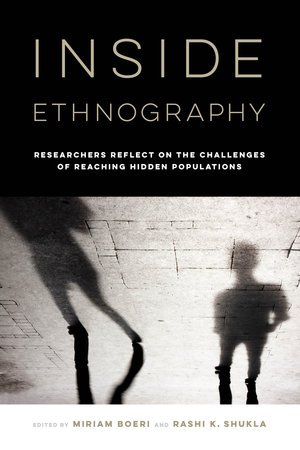This guest post is part of our ASC blog series published in conjunction with the meeting of the American Society of Criminology in San Francisco, CA, November 13-16.
By Rashi K. Shukla, co author of Inside Ethnography: Researchers Reflect on the Challenges of Reaching Hidden Populations
Modern times are forcing the academy to move beyond traditional ways of thinking and learning. In a world of increasing complexity and technological advancement, it is critical that those pursing scientific advancement from the front lines move methodologies and strategies utilized to capture lived experiences of the diverse hidden populations immersed in crime and deviant behaviors. In the criminological world in which I was trained, the lens is more often than not focused outwards. Yet, much can be learned when the lenses of science reflect back. There is a need for those seeking to advance knowledge, impact policies, and ideally, improve lives (if not just by acknowledging and documenting the suffering of others), to shine light on the trials, tribulations, and missteps, that accompany research on the ground level in real world settings.
Those who seek to understand behaviors by moving close to them are forced to venture beyond the physical borders of academic institutions. Getting close may involve delving head-first into risk, uncertainty, and even danger. Stories about these realities, while not uncommon, tend to be omitted or only vaguely described in the traditional outlets of academic dissemination. Capturing behaviors in this manner requires unique skillsets and personalities. If I were to use my own research as an example, the reality is that not everyone is willing to drive fifty or hundred miles with only the hopes of meeting anonymous, former methamphetamine cooks. In addition to the time commitments and financial expenditures such encounters take (often self-funded), personal tolls often accompany such journeys.
Inside Ethnography: Researchers Reflect on the Hidden Challenges of Reaching Hidden Populations advances ethnographic methodologies through the sharing of personal, behind-the-scenes stories on the controversies, ethical dilemmas, individual costs, and consequences that accompany ethnographic fieldwork.
The 21 contributors to Inside Ethnography represent a range of disciplines including criminology, sociology, anthropology, public health, business, and social work. Though diverse disciplines often their own biases, terminologies, and controversies, viewing life and science through diverse lenses advances what is known about human behaviors, moving science forward. Inside Ethnography forewarns of the dangers and risks that accompany getting close to crime, deviance, and the worlds in which they exist. Ground-level costs and consequences are described in a rare manner.
Only by sharing lessons learned do we move critical conversations and scientific endeavors aimed at improving the human condition to the next level. In a discipline within which the parties who capture our attention are suffer and sometimes even die, it is time to join forces to move the pendulum forward. Thank you to all those on the front lines who share the stories that exist behind their research and findings. It is my hope that the courage of the scholars who contributed to Inside Ethnography is appreciated and inspires others to do the same.

